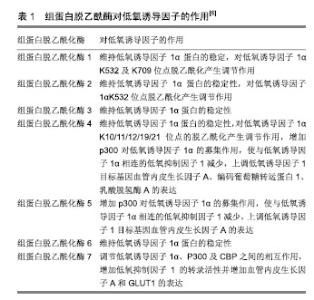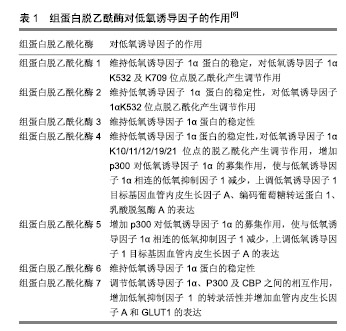Chinese Journal of Tissue Engineering Research ›› 2019, Vol. 23 ›› Issue (34): 5570-5576.doi: 10.3969/j.issn.2095-4344.1448
Protein acetylation in hypoxic environment: research advance and the existing problems
- School of Medicine, Xizang Minzu University, Xianyang 712082, Shaanxi Province, China
-
Received:2019-06-15Online:2019-12-08Published:2019-12-08 -
Contact:Li Wenhua, Professor, School of Medicine, Xizang Minzu University, Xianyang 712082, Shaanxi Province, China -
About author:Zhao Min, Master candidate, School of Medicine, Xizang Minzu University, Xianyang 712082, Shaanxi Province, China -
Supported by:2017 National Natural Science Foundation of China, No. 81760332 (project leader: LWH); 2017 Xizang Science and Technology Department Natural Science Fund (Key Project), No. XZ2017ZRG-67(Z) (project participant: LWH); 2018 Xizang Science and Technology Department Natural Science Project, No. XZ-2018ZRG-71 (project participant: LWH); 2018 Xizang Minzu University Youth Scholars Program, No. 18MDX02 (project participant: LWH)
CLC Number:
Cite this article
Zhao Min, Chen Yao, Li Xuguang, Li Wenhua. Protein acetylation in hypoxic environment: research advance and the existing problems[J]. Chinese Journal of Tissue Engineering Research, 2019, 23(34): 5570-5576.
share this article

2.1 蛋白质乙酰化在基础医学中的应用 2.1.1 蛋白质乙酰化低氧诱导因子的影响 对于低氧环境的适应需要相关转录因子的活化与表达,而在众多转录因子中低氧诱导因子扮演着重要的角色。有报道指出,低氧诱导因子1转录活化须由表观遗传学的调节参与,如:组蛋白乙酰转移酶p300、CBP及TIP60可诱导组蛋白H3与组蛋白H4乙酰化,以增加低氧诱导因子1基因的转录[2-3]。Chen等[4]研究发现,ZMYND8可与低氧诱导因子1α和低氧诱导因子2α相互作用并可通过H3K14ac和H4K16ac的作用,使其赖氨酸的1 007和 1 034位被低氧诱导因子共激活剂p300乙酰化,进而使乳腺癌中低氧诱导因子基因转录活性延长。ZMYND8/ p300/BRD4/HIF轴导致了血管再生、细胞运动活性增强,并在减少肿瘤细胞死亡的基础上加速了乳腺癌的进展,增加了其转移能力。Wu等[5]指出低氧环境可导致与HAUSP赖氨酸443位点相连的K63 泛素化活性增强,对H3K56的乙酰化产生调节,从而促进了低氧环境中低氧诱导因子1α的表达。 Luo等[6]指出组蛋白脱乙酰化酶1-7可通过不同机制增强或抑制低氧诱导因子1的转录活性,见表1。如:在低氧环境中,过表达的组蛋白脱乙酰酶1可通过降低低氧应答肿瘤抑制基因如p53和VHL的表达进而增强人血管内皮细胞的生成;而组蛋白脱乙酰化酶4,组蛋白脱乙酰化酶5及组蛋白脱乙酰化酶6可通过对自身乙酰化程度的调节及对低氧诱导因子1α因子HSP90及p300的活化,增加低氧诱导因子1α的稳定性及活性。然而无论是抑制组蛋白脱乙酰化酶4还是抑制组蛋白脱乙酰化酶5,都会降低低氧诱导因子1α蛋白表达水平并抑制低氧诱导因子1α的活性。而作为组蛋白脱乙酰化酶抑制剂的伏立诺导致的低氧诱导因子2α聚集,可以低氧诱导因子2α-依赖的方式抑制肿瘤的生长[7]。Fischer等[8]指出帕比司他(一种全组蛋白脱乙酰化酶抑制剂)可以浓度依赖的方式显著减少低氧诱导因子1α蛋白在非小细胞肺癌中的表达量。 细胞对低氧环境的适应需要低氧诱导因子1α的稳定表达。Fischer等[8]研究发现去乙酰化酶1的失活与耗竭,将导致在低氧环境中不改变mRNA表达水平的情况下降解低氧诱导因子1α蛋白。去乙酰化酶1可防止低氧诱导因子1α乙酰化,从而使其稳定表达[9]。而Joo等[10]发现低氧条件下,去乙酰化酶1可通过直接与低氧诱导因子1α相连或脱乙酰化以维持低氧诱导因子1α的稳定,但却不影响常氧状态下低氧诱导因子1α蛋白的降解。Lim等[9]研究指出,与低氧诱导因子1α相连的去乙酰化酶1及其Lys674位点的脱乙酰化由组蛋白乙酰转移酶PCAF调节。Dioum等[11]证实去乙酰化酶1可在细胞处于低氧环境期间选择性地刺激活化转录因子低氧诱导因子2α表达。Kang等[12]实验还显示,NAA10第38位色氨酸的羟基化可使低氧诱导因子1α的赖氨酸残基发生乙酰化,而未发生羟基化的NAA10没有此项功能。 在高原低氧环境中,对低氧诱导因子的表达调节是否发生了上述蛋白质乙酰化的改变还有待进一步研究。 2.1.2 蛋白质乙酰化对DNA的影响 研究显示蛋白质乙酰化可对多种细胞内程序进行调节,如:DNA 的转录、复制、聚合及修复等过程。染色质中DAN的外观结构在形成神经细胞瘤时发挥着一定的作用[13]。在成神经细胞瘤中,大约有75个基因受到表观遗传学的影响[14]。DNA的高度甲基化及基因沉默通常与丰富的脱乙酰基酶组蛋白有关[15]。该组蛋白通过改变与DNA绑定的转录因子调节DNA转录[16]。Poljakova等[17]研究发现,处于恶性实体瘤中的细胞通常有适应低氧环境的特性,其可通过改变H3和H4组蛋白乙酰化而影响人成神经细胞瘤细胞在低氧(体积分数1%O2)条件下的生长。低氧可影响c-myc及N-myc这两个转录因子的表达[17]。位于细胞染色质中与DNA特定位置相连的转录因子c-myc,可诱导组蛋白H4乙酰化。Li等[18]通过对在低氧环境中培养的人肺癌A549细胞及人支气管上皮Beas2-B细胞观察发现,低氧环境(体积分数1%O2)可导致乙酰化的组蛋白H4及c-Myc在上述细胞中的表达减少。在由低氧导致c-myc蛋白表达水平下降的同时,促使了低氧诱导因子的表达。而在高原低氧环境中是否伴有c-myc及组蛋白乙酰化水平的改变,从而对DNA的转录产生影响还有待进一步研究。 2.1.3 蛋白质乙酰化对线粒体的影响 有研究报道在线粒体功能的形式与新陈代谢中,蛋白质赖氨酸残基的乙酰化是一个动态的可逆翻译后修饰过程[19]。对于低氧应答的SIRT3 mRNA及蛋白表达量增加,导致线粒体抗氧化酶活性增强[20],并维持线粒体膜的潜在功能[21]。还可通过促使活性氧的产生增加低氧诱导因子1α及糖代谢水平[22-23]。这些研究表明,SIRT3调节的蛋白乙酰化对于调节线粒体对缺氧损伤的应答具有重要作用[24]。 Giralt等[25]研究发现在细胞培养过程中,大约有超过1/3的线粒体蛋白经历过乙酰化修饰,该过程比蛋白磷酸化的3倍还要多[26]。就线粒体水平的部分蛋白质乙酰化可被3种NAD+-依赖的线粒体去乙酰化酶(SIRT3,4和5)调控,它们可对线粒体的功能进行调整。研究表明,SIRT3可通过其对蛋白质乙酰化的影响而对多种细胞程序产生调节。Qiao等[26]发现通过RNA干涉减弱低氧诱导的LC3在线粒体上的定位,可抑制SIRT3在人神经胶质瘤细胞中的表达,并可通过自噬使线粒体降解。Qiao等[26]证实SIRT3可通过增加电压依赖性阴离子选择性通道1(VDAC1)与Parkin蛋白的相互作用激活低氧诱导的线粒体自噬。当细胞处于低氧环境时,抑制SIRT3调节的线粒体自噬可进一步降低线粒体膜稳定性,使活性氧发生聚集,进而通过蛋白酶体通路触发抗凋亡蛋白Mcl-1及存活素蛋白降解。并且抑制SIRT3的表达,不仅可触发凋亡,还可增加肿瘤细胞对于低氧的敏感性。 研究表明SIRT3调节的蛋白乙酰化对调节线粒体在低氧环境造成的损伤应答中起重要作用[27-28]。低氧可导致斑马鱼脑中的线粒体蛋白酰基化发生定向改变,这些蛋白质乙酰化修饰参与多种代谢过程,其中包括氧化磷酸化、蛋白折叠、抗氧化、脂肪酸氧化及ATP的产生、转移等。在所有线粒体蛋白中,对于低氧应答产生作用的蛋白是细胞色素b-c1复合物组1的脱乙酰化。研究发现在缺氧8 h时,这些脱乙酰化的线粒体蛋白与SIRT3(一种NAD+依赖的脱乙酰化酶)的表达性一致,即活性增强。这表明SIRT3对蛋白乙酰化的调节在机体对低氧环境的适应中发挥着重要作用[29]。Liu等[27]研究发现,口服二氢槲皮素可防止成年大鼠在7 d内因处于海拔5 000 m处低压低氧而造成的记忆损伤。当把HT-2细胞暴露于低氧环境时,二氢槲皮素可通过SIRT3诱导的FOXO3脱乙酰化而削弱氧化应激,进而起到相应的神经保护作用有研究报道,已知的线粒体去乙酰化酶有SIRT3、4及5。而最新的研究表明,在线粒体内同样也有SIRT1的表达,其位置临近线粒体DNA,其与线粒体转录因子A的相互作用可对线粒体的生物合成产生调节。 在高原低氧环境中是否伴有因SIRT1、3活性改变,造成对线粒体应激产生的影响还有待进一步研究。 2.2 蛋白质乙酰化在临床医学中的应用 2.2.1 蛋白质乙酰化与肿瘤 已有研究发现,组蛋白H3K18和H4K12乙酰化水平的改变与H3K4的二甲基化共同促进前列腺癌的发生[30]。这些组蛋白的整体修饰对前列腺癌患者的复发具有一定的临床预测性。并且在慢性低氧条件下,前列腺细胞中组蛋白H3K9高度乙酰化,对前列腺癌的发生具有促进作用[31]。亦有报道ACLY的乙酰化修饰对肺癌发生发展具有一定的作用[32]。目前的研究表明,癌组织导致的低氧微环境使组蛋白脱乙酰化酶水平升高,却导致受组蛋白脱乙酰化酶调控的lncRNA-LET表达下降,使其特异性结合的蛋白质核因子[ILF3(NF90)]稳定性增强,最终使ILF3(NF90)下游靶基因低氧诱导因子1α等蛋白水平发生改变,导致癌细胞的转移增强。已有研究发现在人乳腺癌细胞中,CD74与去乙酰化酶SIRT1之间的结合被YB1影响,从而调控CD74的乙酰化修饰及CD74的稳定性[33]。但是,通过对具有不同转移能力肝癌细胞系的组蛋白H3乙酰化修饰位点进行定量分析,得到了6个乙酰化修饰肽段和4个甲基化修饰肽段的定量信息,却发现随着肝癌的发生和转移潜能的升高,鉴定到的6条乙酰化和4条甲基化肽段含量都发生了明显下降[34]。 有研究发现肿瘤干细胞的数量被乙酰化酶化学药物抑制而减少,并且组蛋白脱乙酰化的抑制剂能使宫颈部鳞状细胞癌的上皮与间质转变减少,降低恶性程度[35]。吉非替尼能直接或间接促进肿瘤细胞中的组蛋白H3高乙酰化形成[36],增强P300/CBP活性,降低P21的表达,停滞癌细胞周期,最终起到杀死肿瘤细胞的作用。研究揭示真核起始因子5A(eIF5A)是参与翻译伸长和细胞增殖的重要蛋白,在长时间低氧环境中,eIF5A乙酰化水平的升高与低氧诱导因子1α的降低有关[37]。 2.2.2 蛋白质乙酰化与心脑血管疾病 研究发现多种缺血再灌注疾病的发病机制涉及蛋白质的乙酰化与脱乙酰化过程[38]。Bochaton等[39]研究发现,随着心肌缺血再灌注促进渗透性转换孔开放及随之而来的细胞死亡,导致了亲环蛋白D乙酰化水平的增高。因此,心肌缺血后可通过增加SIRT3(SIRT3能使亲环蛋白D脱乙酰化,从而起到抑制渗透性转换孔的作用)的活性并削弱再灌注时亲环蛋白D的乙酰化,达到预防致死性再灌注损伤的作用[40]。Nadtochiy等[41]研究发现在急性缺血预处理期间,SIRT1可对心肌细胞胞浆蛋白的脱乙酰化过程产生调节,从而对心肌产生保护作用。随后Nadtochiy等[42]再次证明了SIRT1信号在急性缺血预处理中对心肌的保护作用。最近的研究发现磷酸二酯酶5抑制剂西地那非预处理后,心肌细胞膜电位损伤明显减轻,ATP产生量增加,同时心肌细胞凋亡减少,SIRT3表达增加,PGC-1α乙酰化减少。磷酸二酯酶5抑制剂通过保护线粒体功能抑制缺氧心肌细胞凋 亡[43]。组蛋白脱乙酰化酶抑制剂可以提高致命性失血性休克的存活率,调节失血/脂多糖后的炎症反应。研究发现在严重缺氧模型中,SAHA治疗可能通过抑制低氧诱导因子1α/血红素加氧酶1通路增加创伤性白细胞炎症反应[44]。 研究发现在斑马鱼和小鼠的血管生成中,磷蛋白样3可保护血管内皮生长因子受体2不发生错误折叠和聚集[45]。低氧和N端蛋氨酸乙酰化在磷蛋白样3表达中的作用及其对血管内皮生长因子受体2的影响提供了新的见解。低氧和组蛋白脱乙酰化酶抑制剂(TSA)在心肌细胞中对miR-126具有协同诱导作用,从而增加了pp-ERK和p-Akt的表达,表明miR-126参与了组蛋白脱乙酰化酶抑制剂对缺血的保护作用[46]。与成年心机相比,necroptosis的标志蛋白RIP1、RIP3在衰老心肌中的表达都升高,并且necroptosis的调节蛋白去乙酰化酶SIRT2表达和活性也显著升高,RIP1的乙酰化水平也升高,当给予小剂量necroptosis抑制剂处理后,衰老心肌梗死面积显著减少[47]。在脑缺血预适应过程中,皮质区域神经元染色体组蛋白乙酰化水平上调,同时抑制组蛋白脱乙酰化酶3能够通过上调靶基因染色质乙酰化水平而激活内源性保护机制,使脑处于预适应状态。这组蛋白脱乙酰化酶亚型参与缺血预适应保护的作用机制,为脑卒中神经保护剂的开发提供了新的思路[48]。 2.2.3 蛋白质乙酰化与阿尔茨海默病 研究显示阿尔茨海默病患者脑内乙酰转移酶p300活性显著上升的同时,tau蛋白高度乙酰化[49]。另有报道,阿尔茨海默病患者脑内全局组蛋白的乙酰化修饰显著增加,促进某些基因的转录活性[50],如APP剪切酶与PS1等基因的启动子区域组蛋白发生乙酰化而促进β淀粉样蛋白的形成[48]。组蛋白发生乙酰化修饰参与多个环节调节脑内β淀粉样蛋白的含量,增加的组蛋白乙酰化修饰与神经毒性可能有联系[51]。 2.2.4 蛋白质乙酰化与糖尿病 最近研究表明在糖尿病患者的心脏中,组蛋白脱乙酰化酶6的过度活化及Prdx1乙酰化水平的降低可使机体更易发生缺血再灌注损伤。并且发现高选择性的组蛋白脱乙酰化酶6抑制剂(TubA)治疗可显著提升心功能,降低心肌梗死的发生,减少活性氧的产生并可增加糖尿病缺血再灌注大鼠的Prdx1乙酰化水平。Prdx1在K197位点的乙酰化可抑制组蛋白脱乙酰化酶6活化,减少活性氧的产生,起到抗心肌缺血再灌注损伤及缺氧/再氧合的作用。在糖尿病患者中,组蛋白脱乙酰化酶6的过度活化可加剧糖尿病患者心脏心肌缺血再灌注损伤损伤。在体内或体外用药物抑制组蛋白脱乙酰化酶6的活性,可通过调节K917位点的乙酰化作用而恢复Prdx1清除活性氧的能力。综上,这些发现表明Prdx1在K197位点的乙酰化可抑制组蛋白脱乙酰化酶6的活化,减少活性氧的产生,进而起到抗心肌缺血再灌注损伤及缺氧/再氧合的作用[52]。 "

| [1]Watson JA,Watson CJ,McCrohan AM,et al.Generation of an epigenetic signature by chronic hypoxia in prostate cells.Hum Mol Genet.2009;18(19):3594-3604.[2]Perez-Perri JI,Dengler VL,Audetat KA,et al.The TIP60 complex is a conserved coactivator of HIF1A.Cell Rep. 2016; 1(16):37-47.[3]Wang Q,Zhang Y,Yang C,et al.Acetylation of metabolic enzymes coordinates carbon source utilization and metabolic flux.Science.2010;327:1004-1007.[4]Chen Y,Zhang B,Bao L,et al.ZMYND8 acetylation mediates HIF-dependent breast cancer progression and metastasis.J Clin Invest.2018;128(5):1937-1955.[5]Wu H,Kuo Y,Hung J,et al.K63-polyubiquitinated HAUSP deubiquitinates HIF-1α and dictates H3K56 acetylation promoting hypoxia-induced tumour progression.Nat Commun. 2016;7:13644.[6]Luo W,Wang Y.Epigenetic regulators: multifunctional proteins modulating hypoxia-inducible factor-α protein stability and activity.Cell Mol Life Sci.2018;75(6):1043-1056.[7]Choudhry H,Harris AL.Advances in Hypoxia-Inducible Factor Biology.Cell Metab. 2018;27(2):281-298.[8]Fischer C,Leithner K,Wohlkoenig C,et al.Panobinostat reduces hypoxia-induced cisplatin resistance of non-small cell lung carcinoma cells via HIF-1alpha destabilization.Mol Cancer. 2015;14:4.[9]Lim JH,Lee YM,Chun YS,et al.Sirtuin 1 modulates cellular responses to hypoxia by deacetylating hypoxia-inducible factor 1alpha.Mol Cell.2010;38(6):864-878.[10]Joo H,Yun M,Jeong J,et al.SIRT1 deacetylates and stabilizes hypoxia-inducible factor-1α (HIF-1α) via direct interactions during hypoxia.Biochem Biophys Res Commun. 2015;462(4): 294-300.[11]Dioum EM,Chen R,Alexander MS,et al.Regulation of Hypoxia-Inducible Factor2 Signaling by the Stress-Responsive Deacetylase Sirtuin 1.Science. 2009;324 (5932):1289-1293.[12]Kang J,Chun Y,Huh J,et al.FIH permits NAA10 to catalyze the oxygen-dependent lysyl-acetylation of HIF-1α.Redox Biol. 2018;19:364-374.[13]Furchert SE, Lanvers-Kaminsky C,Juürgens H,et al.Inhibitors of histone deacetylases as potential therapeutic tools for high-risk embryonal tumors of the nervous system of childhood.Int J Cancer. 2007;120(8):1787-1794.[14]Decock A,Ongenaert M,Vandesompele J,et al. Neuroblastoma epigenetics: from candidate gene approaches to genome-wide screenings.Epigenetics.2011; 6(8):962-970.[15]Santini V,Gozzini A,Ferrari G.Histone deacetylase inhibitors: molecular and biological activity as a premise to clinical application.Curr Drug Metab.2007;8(4):383-393.[16]Portela A,Esteller M.Epigenetic modifications and human disease.Nat Biotechnol. 2010;28(10):1057-1068.[17]Poljaková J,Groh T,Gudino ZO,et al.Hypoxia-mediated histone acetylation and expression of N-myc transcription factor dictate aggressiveness of neuroblastoma cells.Oncol Rep. 2014;31(4):1928-1934.[18]Li Q,Costa M.c-Myc mediates a hypoxia-induced decrease in acetylated histone H4.Biochimie. 2009;91(10): 1307-1310.[19]Rardin MJ,Newman JC,Held JM,et al.Label-free quantitative proteomics of the lysine acetylome in mitochondria identifies substrates of SIRT3 in metabolic pathways.Proc Natl Acad Sci U S A.2013;110(16):6601-6606.[20]Tseng AH,Wu LH,Shieh SS,et al.SIRT3 interactions with FOXO3 acetylation, phosphorylation and ubiquitinylation mediate endothelial cell responses to hypoxia.Biochem J. 2014;464(1):157-168.[21]Pellegrini L,Pucci B,Villanova L,et al.SIRT3 protects from hypoxia and staurosporine-mediated cell death by maintaining mitochondrial membrane potential and intracellular pH. Cell Death Differ. 2012;19(11):1815-1825. [22]Finley LWS,Haas W,Desquiret-Dumas V,et al.Succinate dehydrogenase is a direct target of sirtuin 3 deacetylase activity.PloS One.2011;6(8):e23295.[23]Bell EL,Emerling BM,Ricoult SJ,et al.SirT3 suppresses hypoxia inducible factor 1α and tumor growth by inhibiting mitochondrial ROS production. Oncogene. 2011;26(30): 2986-2996.[24]Dhillon RS,Richards JG.Hypoxia induces selective modifications to the acetylome in the brain of zebrafish (Danio rerio).Comp Biochem Physiol B Biochem Mol Biol. 2018;(224): 79-87.[25]Giralt A,Villarroya F.SIRT3, a pivotal actor in mitochondrial functions: metabolism, cell death and aging.Biochem J. 2012; 444(1):1-10.[26]Qiao A,Wang K,Yuan Y,et al.Sirt3-mediated mitophagy protects tumor cells against apoptosis under hypoxia. Oncotarget.2016;28(7):43390-43400.[27]Liu P,Zou D,Chen K,et al. Dihydromyricetin Improves Hypobaric Hypoxia-Induced Memory Impairment via Modulation of SIRT3 Signaling.Mol Neurobiol. 2016;53(10): 7200-7212.[28]He W,Newman JC,Wang MZ,et al.Mitochondrial sirtuins: regulators of protein acylation and metabolism.Trends Endocrinol Metabol.2012;23(9):467-476.[29]Aquilano K,Vigilanza P,Baldelli S,et al.Peroxisome Proliferator-activated Receptor γ Co-activator 1α (PGC-1α) and Sirtuin 1 (SIRT1) Reside in Mitochondria.J Biol Chem. 2010;285(28):21590-21599.[30]Seligson DB,Horvath S,Shi T,et al.Global histone modification patterns predict risk of prostate cancer recurrence. Nature. 2005;435(7046):1262-1266.[31]Watson JA,Watson CJ, McCrohan AM,et al.Generation of an epigenetic signature by chronic hypoxia in prostate cells.Hum Mol Genet.2009;18(19):3594-3604.[32]林瑞婷.柠檬酸裂酶的乙酰化调控及其在肺癌中的作用和分子机制[D].上海:复旦大学,2013.[33]李毓.乳腺癌细胞中CD74乙酰化调控的分子机制[D].上海:复旦大学,2017.[34]王文岩.肝癌细胞组蛋白H3乙酰化修饰定量及乙酰化分离富集新方法研究[D].上海:复旦大学,2011.[35]Giudice FS,Pinto DS Jr,Nör JE, et al.Inhibition of histone deacetylase impacts cancer stem cells and induces epithelial-mesenchyme transition of head and neck cancer. PloS One.2013;8(3):e58672.[36]Kaur J,Tikoo K.p300/CBP dependent hyperacetylation of histone potentiates anticancer activity of gefitinib nanoparticles.Biochim Biophys Acta. 2013;1833(5): 1028-1040.[37]Tariq M,Ito A,Ishfaq M,et al.Eukaryotic translation initiation factor 5A (eIF5A) is essential for HIF-1α activation in hypoxia. Biochem Biophys Res Commun. 2016;470(2):417-424.[38]Tang J,Zhuang S.Histone acetylation and DNA methylation in ischemia/reperfusion injury.Clin Sci.2019;133(4):597-609.[39]Bochaton T,Crola-Da-Silva C,Pillot B,et al.Inhibition of myocardial reperfusion injury by ischemic postconditioning requires sirtuin 3-mediated deacetylation of cyclophilin D.J Mol Cell Cardiol.2015;84:61-69.[40]Hafner AV,Dai J,Gomes AP,et al.Regulation of the mPTP by SIRT3‐mediated deacetylation of CypD at lysine 166 suppresses age-related cardiac hypertrophy. Aging. 2012; 12(2):914-923. [41]Nadtochiy SM,Redman E,Rahman I,et al.Lysine deacetylation in ischaemic preconditioning: the role of SIRT1.Cardiovas Res.2011;89(3):643-649.[42]Nadtochiy SM,Urciuoli W,Zhang J,et al.Metabolomic profiling of the heart during acute ischemic preconditioning reveals a role for SIRT1 in rapid cardioprotective metabolic adaptation.J Mol Cell Cardiol.2015;88:64-72.[43]Jia H,Guo Z,Yao Y.PDE5 inhibitor protects the mitochondrial function of hypoxic myocardial cells.Exp Ther Med. 2019; 17(1):199-204.[44]Sailhamer EA,Li Y,Smith EJ,et al.Hypoxic “second hit” in leukocytes from trauma patients: Modulation of the immune response by histone deacetylase inhibition. Cytokine. 2010; 49(3):303-311.[45]Srinivasan S,Chitalia V,Meyer RD,et al.Hypoxia-induced expression of phosducin-like 3 regulates expression of VEGFR-2 and promotes angiogenesis. Angiogenesis. 2015;18(4):449-462.[46]施华萍.低氧和HDAC抑制剂在心肌细胞对mir-126的协同诱导作用[D].杭州:浙江大学,2013.[47]李晨,陈迈,马恒.衰老心肌缺血/再灌注损伤增加的新机制—程序性坏死的关键作用[J].心脏杂志, 2016,29(3):263-267.[48]杨晓宇.组蛋白去乙酰化酶3(HDAC3)参与脑缺血预适应保护功能的机制研究[D].北京:中国科学院大学,2016.[49]Lu X,Deng Y,Yu D,et al.Histone Acetyltransferase p300 Mediates Histone Acetylation of PS1 and BACE1 in a Cellular Model of Alzheimer's Disease.PloS One. 2014;9(7): e103067.[50]Narayan PJ,Lill C,Faull R,et al.Increased acetyl and total histone levels in post-mortem Alzheimer's disease brain. Neurobiol Dis.2015;74:281-294.[51]Frost B,Hemberg M,Lewis J,et al.Tau promotes neurodegeneration through global chromatin relaxation.Nat Neurosci.2014;17(3):357.[52]Leng Y, Wu Y, Lei S, et al.Inhibition of HDAC6 Activity Alleviates Myocardial Ischemia/Reperfusion Injury in Diabetic Rats: Potential Role of Peroxiredoxin 1 Acetylation and Redox Regulation.Oxid Med Cell Longev. 2018;2018: 9494052. [53]Allfrey VG,Faul kner R,Mirsky AE.Acetylation and methylation of histones and their possible role in the regulation of RNA synthesis.Proc Natl Acad Sci USA. 1964;51:786-794.[54]Yu BJ,Kim JA,Moon JH,et al.The diversity of lysineacetylated proteins in Escherichia coli.J Microbiol Biotechnol. 2008;18:1529-1536.[55]Goodman RH,Smolik S.CBP/P300 in cell growth, transformation and development.Genes Dev. 2000;14(13): 1553-1577.[56]Huai W,Liu X,Wang C,et al.KAT8 selectively inhibits antiviral immunity by acetylating IRF3. J Exp Med. 2019;216(4): 772-785. |
| [1] | Lin Qingfan, Xie Yixin, Chen Wanqing, Ye Zhenzhong, Chen Youfang. Human placenta-derived mesenchymal stem cell conditioned medium can upregulate BeWo cell viability and zonula occludens expression under hypoxia [J]. Chinese Journal of Tissue Engineering Research, 2021, 25(在线): 4970-4975. |
| [2] | Gu Xia, Zhao Min, Wang Pingyi, Li Yimei, Li Wenhua. Relationship between hypoxia inducible factor 1 alpha and hypoxia signaling pathway [J]. Chinese Journal of Tissue Engineering Research, 2021, 25(8): 1284-1289. |
| [3] | Hou Jingying, Yu Menglei, Guo Tianzhu, Long Huibao, Wu Hao. Hypoxia preconditioning promotes bone marrow mesenchymal stem cells survival and vascularization through the activation of HIF-1α/MALAT1/VEGFA pathway [J]. Chinese Journal of Tissue Engineering Research, 2021, 25(7): 985-990. |
| [4] | Fan Quanbao, Luo Huina, Wang Bingyun, Chen Shengfeng, Cui Lianxu, Jiang Wenkang, Zhao Mingming, Wang Jingjing, Luo Dongzhang, Chen Zhisheng, Bai Yinshan, Liu Canying, Zhang Hui. Biological characteristics of canine adipose-derived mesenchymal stem cells cultured in hypoxia [J]. Chinese Journal of Tissue Engineering Research, 2021, 25(7): 1002-1007. |
| [5] | Liu Cong, Liu Su. Molecular mechanism of miR-17-5p regulation of hypoxia inducible factor-1α mediated adipocyte differentiation and angiogenesis [J]. Chinese Journal of Tissue Engineering Research, 2021, 25(7): 1069-1074. |
| [6] | Zhao Min, Feng Liuxiang, Chen Yao, Gu Xia, Wang Pingyi, Li Yimei, Li Wenhua. Exosomes as a disease marker under hypoxic conditions [J]. Chinese Journal of Tissue Engineering Research, 2021, 25(7): 1104-1108. |
| [7] | Jiao Hui, Zhang Yining, Song Yuqing, Lin Yu, Wang Xiuli. Advances in research and application of breast cancer organoids [J]. Chinese Journal of Tissue Engineering Research, 2021, 25(7): 1122-1128. |
| [8] | Wang Shiqi, Zhang Jinsheng. Effects of Chinese medicine on proliferation, differentiation and aging of bone marrow mesenchymal stem cells regulating ischemia-hypoxia microenvironment [J]. Chinese Journal of Tissue Engineering Research, 2021, 25(7): 1129-1134. |
| [9] | Liu Bo, Chen Xianghe, Yang Kang, Yu Huilin, Lu Pengcheng. Mechanism of DNA methylation in exercise intervention for osteoporosis [J]. Chinese Journal of Tissue Engineering Research, 2021, 25(5): 791-797. |
| [10] | Liu Yang, Gong Yi, Fan Wei. Anti-hepatoma activity of targeted Pluronic F127/formononetin nanocomposite system in vitro [J]. Chinese Journal of Tissue Engineering Research, 2021, 25(4): 526-531. |
| [11] | Lin Qingfan, Xie Yixin, Chen Wanqing, Ye Zhenzhong, Chen Youfang. Human placenta-derived mesenchymal stem cell conditioned medium can upregulate BeWo cell viability and zonula occludens expression under hypoxia [J]. Chinese Journal of Tissue Engineering Research, 2021, 25(31): 4970-7975. |
| [12] | Chen Shi, Du Chao, He Xuemei, Zhou Xiangyu. Effect of proanthocyanidins on proliferation and differentiation of skeletal muscle satellite cells under hypoxic-ischemic condition [J]. Chinese Journal of Tissue Engineering Research, 2021, 25(26): 4130-4136. |
| [13] | Gao Shan, Huang Dongjing, Hong Haiman, Jia Jingqiao, Meng Fei. Comparison on the curative effect of human placenta-derived mesenchymal stem cells and induced islet-like cells in gestational diabetes mellitus rats [J]. Chinese Journal of Tissue Engineering Research, 2021, 25(25): 3981-3987. |
| [14] | Lu Yuyun, Huang Mei, Shi Xinlei, Chen Baoyan. Bibliometric and visualization analysis of breast cancer stem cell literature from 2011 to 2020 based on Web of Science database [J]. Chinese Journal of Tissue Engineering Research, 2021, 25(25): 4001-4008. |
| [15] | Xu Guilan, Song Jiansheng, Yang Shijiang. Regulation of S100A4 gene silencing by ultrasound microbubbles on the stemness and epithelial-mesenchymal transformation of gastric cancer stem cells#br# [J]. Chinese Journal of Tissue Engineering Research, 2021, 25(25): 4025-4031. |
| Viewed | ||||||
|
Full text |
|
|||||
|
Abstract |
|
|||||